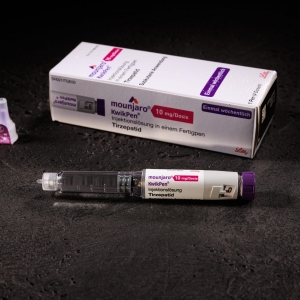Introduction
Cabermax 1 mg, which has the active ingredient cabergoline, is a commonly prescribed dopamine agonist for hyperprolactinemia, prolactinomas, and occasionally Parkinson's disease. Although its main role is to lower high levels of prolactin, patients tend to inquire about:
"Does Cabermax affect blood pressure — and can it cause hypotension?"
The short answer: Yes, it can, especially in the early stages of treatment or when the dose is increased. This effect is typically called orthostatic hypotension (a sudden drop in blood pressure upon standing).
In this guide, we’ll cover:
-
How Cabermax 1 mg influences blood pressure
-
Why hypotension happens
-
Signs and symptoms to look out for
-
Strategies to reduce risk
-
Who’s most at risk
-
When to seek medical help
1. Understanding Cabermax 1 mg and Its Mechanism
Cabermax's active ingredient, cabergoline, is a dopamine D₂ receptor agonist.
It lowers the production of prolactin by acting on the pituitary gland.
But dopamine agonists also impact the autonomic nervous system, which is in charge of managing blood pressure. That is why dizziness or fainting can sometimes happen, especially when rising rapidly from sitting or lying down.
2. How Cabermax 1 mg Can Lower Blood Pressure
2.1 Orthostatic Hypotension
The most common blood pressure-related side effect is orthostatic hypotension:
-
Caused by reduced vascular tone when dopamine receptors are activated.
-
More likely within the first few hours after a dose.
2.2 Dose-Dependent Effect
Higher doses or rapid dose increases can lead to more pronounced blood pressure drops.
2.3 Interaction with Other Medications
If taken with antihypertensive drugs, the risk of low blood pressure increases.
3. Research Evidence
-
Clinical studies on cabergoline have shown a noticeable reduction in systolic and diastolic blood pressure after administration.
-
The effect is most significant in the first week of treatment but may persist in sensitive individuals.
-
A study in The Journal of Neurology, Neurosurgery & Psychiatry found that up to 10% of patients reported dizziness or fainting related to orthostatic hypotension.
4. Symptoms of Low Blood Pressure from Cabermax 1 mg
Patients should be aware of the following signs:
-
Dizziness or lightheadedness
-
Blurred vision
-
Fainting (syncope)
-
Weakness or fatigue
-
Nausea
-
Confusion (in severe cases)
These symptoms are typically worse when standing suddenly after sitting or lying down.
5. Risk Factors for Hypotension with Cabermax 1 mg
Certain factors increase susceptibility:
-
Older age – reduced blood pressure regulation
-
Dehydration – lower blood volume
-
Heart conditions – reduced cardiovascular reserve
-
Concurrent antihypertensive use – additive effects
-
Rapid dose escalation – body doesn’t have time to adjust
6. Preventing Hypotension While on Cabermax 1 mg
6.1 Start Low, Go Slow
-
Begin with the lowest effective dose and increase gradually.
-
Typical starting dose for hyperprolactinemia: 0.25 mg twice weekly.
6.2 Take at Night
-
Taking the dose at bedtime can reduce the risk of dizziness during waking hours.
6.3 Stay Hydrated
-
Adequate water intake helps maintain blood volume.
6.4 Stand Up Slowly
-
Give your body time to adjust when changing position.
6.5 Avoid Alcohol
-
Alcohol can amplify the blood pressure-lowering effects.
7. What to Do If You Experience Symptoms
-
Sit or lie down immediately if dizziness occurs.
-
Drink water and rest until symptoms pass.
-
Avoid driving or operating heavy machinery until stable.
-
Contact your doctor if episodes are frequent or severe.
8. When Hypotension Becomes Dangerous
Seek urgent medical help if you experience:
-
Fainting with injury
-
Persistent confusion
-
Chest pain
-
Shortness of breath
-
Irregular heartbeat
These may indicate more severe cardiovascular effects requiring immediate attention.
9. Monitoring Blood Pressure on Cabermax 1 mg
Your healthcare provider may recommend:
-
Baseline BP check before starting
-
Regular follow-up readings (especially in the first month)
-
Home BP monitoring if you have a history of hypotension
10. Balancing Benefits and Risks
For most patients, the prolactin-lowering benefits of Cabermax 1 mg outweigh the mild and temporary hypotensive effects. However, for those at high risk, dose adjustments or alternative treatments may be considered.
11. Special Populations
-
Elderly patients – Start at even lower doses to avoid falls from dizziness.
-
Pregnant women – Usually discontinued unless tumor risk is high; BP monitoring is crucial.
-
Patients with Parkinson’s disease – May already have autonomic instability, increasing hypotension risk.
12. FAQs – Cabermax and Blood Pressure
Q1: Does everyone on Cabermax 1 mg experience low blood pressure?
A: No, but dizziness and mild BP drops are common in the first few weeks.
Q2: Can I take my BP medicine with Cabermax 1 mg?
A: Sometimes, but your doctor may adjust the dose to reduce hypotension risk.
Q3: How long do blood pressure effects last?
A: Usually, they lessen after your body adjusts, within a few weeks.
Q4: Should I stop Cabermax 1 mg if I feel faint?
A: Do not stop suddenly—contact your doctor for dose evaluation.
Q5: Is nighttime dosing better?
A: Yes, it can help reduce daytime dizziness.
13. Key Takeaways
-
Cabermax 1 mg can lower blood pressure, especially soon after dosing.
-
Risk is higher with high doses, rapid increases, dehydration, and concurrent BP meds.
-
Preventive measures like hydration, slow position changes, and bedtime dosing help.
-
Monitoring is essential in the first few weeks of therapy.
Conclusion
Cabermax 1 mg is very effective in treating prolactin disorders, but its possible low blood pressure-inducing nature, particularly orthostatic hypotension, cannot be overlooked. Fortunately, this side effect is mild, transient, and easily manageable with proper precautions for most individuals.
By beginning at a low dose, being well-hydrated, and closely monitoring symptoms, patients can reduce risks while reaping the benefits of this potent dopamine agonist. Be sure to closely work with your provider for effective and safe treatment.









